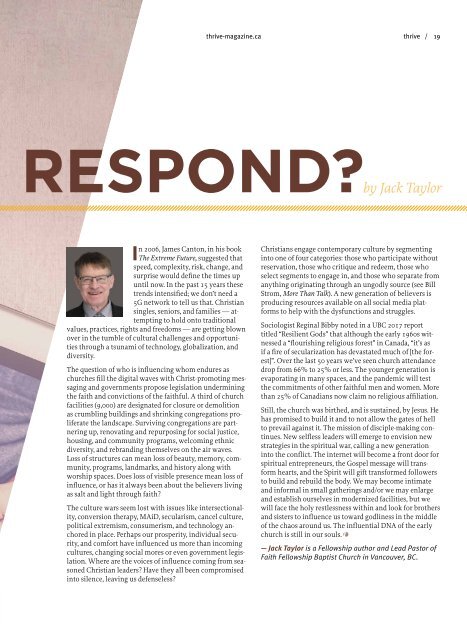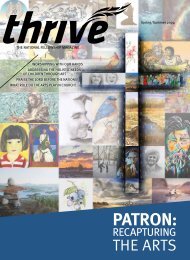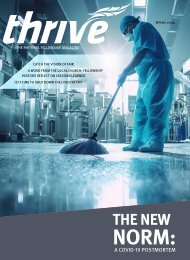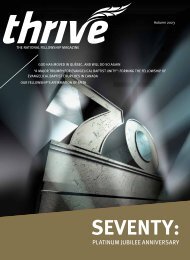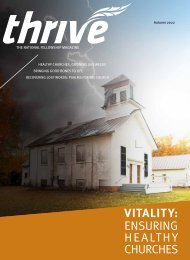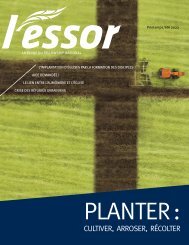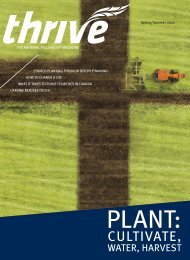Create successful ePaper yourself
Turn your PDF publications into a flip-book with our unique Google optimized e-Paper software.
thrive-magazine.ca<br />
thrive / 19<br />
RESPOND?by Jack<br />
Taylor<br />
In 2006, James Canton, in his book<br />
The Extreme Future, suggested that<br />
speed, complexity, risk, change, and<br />
surprise would define the times up<br />
until now. In the past 15 years these<br />
trends intensified; we don’t need a<br />
5G network to tell us that. Christian<br />
singles, seniors, and families — attempting<br />
to hold onto traditional<br />
values, practices, rights and freedoms — are getting blown<br />
over in the tumble of cultural challenges and opportunities<br />
through a tsunami of technology, globalization, and<br />
diversity.<br />
The question of who is influencing whom endures as<br />
churches fill the digital waves with Christ-promoting messaging<br />
and governments propose legislation undermining<br />
the faith and convictions of the faithful. A third of church<br />
facilities (9,000) are designated for closure or demolition<br />
as crumbling buildings and shrinking congregations proliferate<br />
the landscape. Surviving congregations are partnering<br />
up, renovating and repurposing for social justice,<br />
housing, and community programs, welcoming ethnic<br />
diversity, and rebranding themselves on the air waves.<br />
Loss of structures can mean loss of beauty, memory, community,<br />
programs, landmarks, and history along with<br />
worship spaces. Does loss of visible presence mean loss of<br />
influence, or has it always been about the believers living<br />
as salt and light through faith?<br />
The culture wars seem lost with issues like intersectionality,<br />
conversion therapy, MAiD, secularism, cancel culture,<br />
political extremism, consumerism, and technology anchored<br />
in place. Perhaps our prosperity, individual security,<br />
and comfort have influenced us more than incoming<br />
cultures, changing social mores or even government legislation.<br />
Where are the voices of influence coming from seasoned<br />
Christian leaders? Have they all been compromised<br />
into silence, leaving us defenseless?<br />
Christians engage contemporary culture by segmenting<br />
into one of four categories: those who participate without<br />
reservation, those who critique and redeem, those who<br />
select segments to engage in, and those who separate from<br />
anything originating through an ungodly source (see Bill<br />
Strom, More Than Talk). A new generation of believers is<br />
producing resources available on all social media platforms<br />
to help with the dysfunctions and struggles.<br />
Sociologist Reginal Bibby noted in a UBC 2017 report<br />
titled “Resilient Gods” that although the early 1960s witnessed<br />
a “flourishing religious forest” in Canada, “it’s as<br />
if a fire of secularization has devastated much of [the forest]”.<br />
Over the last 50 years we’ve seen church attendance<br />
drop from 66% to 25% or less. The younger generation is<br />
evaporating in many spaces, and the pandemic will test<br />
the commitments of other faithful men and women. More<br />
than 25% of Canadians now claim no religious affiliation.<br />
Still, the church was birthed, and is sustained, by Jesus. He<br />
has promised to build it and to not allow the gates of hell<br />
to prevail against it. The mission of disciple-making continues.<br />
New selfless leaders will emerge to envision new<br />
strategies in the spiritual war, calling a new generation<br />
into the conflict. The internet will become a front door for<br />
spiritual entrepreneurs, the Gospel message will transform<br />
hearts, and the Spirit will gift transformed followers<br />
to build and rebuild the body. We may become intimate<br />
and informal in small gatherings and/or we may enlarge<br />
and establish ourselves in modernized facilities, but we<br />
will face the holy restlessness within and look for brothers<br />
and sisters to influence us toward godliness in the middle<br />
of the chaos around us. The influential DNA of the early<br />
church is still in our souls.<br />
— Jack Taylor is a Fellowship author and Lead Pastor of<br />
Faith Fellowship Baptist Church in Vancouver, BC.


